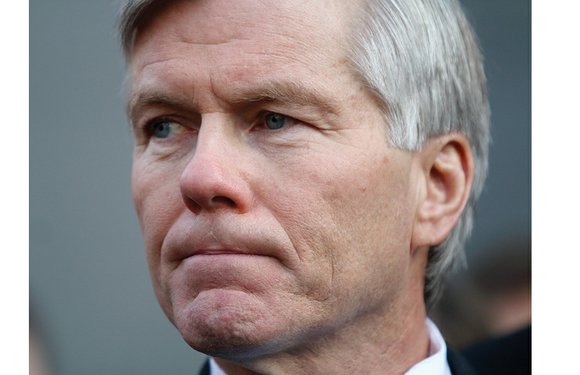No jail
U.S. Supreme Court overturns corruption convictions of former Gov. McDonnell
Free Press staff, wire reports | 7/1/2016, 6:06 a.m.

WASHINGTON
Former Virginia Gov. Bob McDonnell insisted that he never sold his office in exchange for the $177,000 in loans and gifts that a businessman seeking to promote a dietary product showered on him and his family.
This week, the U.S. Supreme Court agreed with the former governor, who made history two years ago as the first person to hold the state’s chief executive post to be convicted on corruption charges.
In an 8-0 decision, the high court threw out his felony convictions, likely saving the governor from a two-year federal prison sentence and allowing politicians around the country to breathe easier.
The court agreed with the core of Mr. McDonnell’s defense, stating that the trial judge, U.S. District Court Senior Judge James R. Spencer, and prosecutors relied on an overly broad definition of the “official acts.”
Writing for the court, Chief Justice John Roberts found that instructions on the law that Judge Spencer provided to Mr. McDonnell’s jury were so broad that any action a public official might take for a donor could be considered an “official action.”
The chief justice stated that the evidence, instead, showed Mr. McDonnell’s actions regarding the businessmen, Jonnie R. Williams, fit within the routine of government officials. As governor, Mr. McDonnell introduced Mr. Williams to others and even held a party for him at the Executive Mansion to promote his dietary product, but did not do anything to push others to support the product.
In order to be a public action, the chief justice stated, there has to be some showing of a decision or action.
“Setting up a meeting, talking to another official or organizing an event (or agreeing to do so) — without more — does not fit that definition of official act,” the chief justice wrote.
“There is no doubt that this case is distasteful; it may be worse than that,” the chief justice continued. “But our concern is not with tawdry tales of Ferraris, Rolexes and ball gowns. It is instead with the broader legal implications of the government’s boundless interpretation of the federal bribery statute.”
Mr. McDonnell, once a rising star of the Republican Party, expressed his “heartfelt gratitude” after Monday’s decision.
“From the outset, I strongly asserted my innocence before God and under the law,” he wrote in a statement. “I have not, and would not, betray the sacred trust the people of Virginia bestowed upon me during 22 years in elected office.”
“It is my hope that this matter will soon be over and that my family and I can begin to rebuild our lives,” Mr. McDonnell stated.
Republican colleagues in Virginia offered warm words for the former governor, as did Democratic Gov. Terry McAuliffe, who used the McDonnell case to promote ethics reforms for his office and at the General Assembly during his first two years.
In a statement to the Free Press, Gov. McAuliffe wrote, “Bob McDonnell and his family have remained in my thoughts and prayers throughout this episode. The governor made mistakes and has apologized, but the Supreme Court has ruled unanimously that his trial should not have resulted in a criminal conviction. It is my hope that today’s ruling is the beginning of the end of this difficult process for our Commonwealth.”
The former governor is not yet fully cleared. The justices’ decision sends his case back to the 4th U.S. Circuit Court of Appeals, which must decide whether a jury could have been able to convict Mr. McDonnell if they were given the correct legal definition for an “official action.”
Prosecutors could only seek a new trial if the 4th Circuit believes the jury could have convicted, but most legal experts regard that as a long shot.
During an interview Wednesday on WTOP radio in Washington, Gov. McAuliffe said he hoped Mr. McDonnell wouldn’t be retried on public corruption charges, noting the high court’s ruling makes a new trial unlikely.
“It’s time to move on,” he said. “This man has paid the price.”
In September 2014, a federal jury in Richmond found Mr. McDonnell guilty of 11 counts of corruption stemming from his acceptance of gifts and loans from Mr. Williams, then CEO of Star Scientific Inc., in exchange for promoting his dietary supplement.
The former governor’s wife, Maureen, who was convicted of eight counts of corruption, was sentenced to a year and a day in prison, but is appealing. Both have remained free during appeals.
Monday’s ruling could well result in the dismissal of Mrs. McDonnell’s convictions, now on hold at the 4th Circuit.
William A. Burck of the law firm Quinn Emanuel Urquhart & Sullivan LLP said the ruling means her conviction will be thrown out. As first lady, she was not a public official and her convictions were derived from those of her husband, he said.
The Justice Department has declined to comment on both cases.
Noah Bookbinder, executive director of Citizens for Responsibility and Ethics in Washington, found the ruling disappointing.
“Bribery has always been a difficult charge to prove, and the Supreme Court just made it more difficult,” Mr. Bookbinder said. “There are a few instances of what a lot of us see as corruption which will be more difficult to prove now.”
It’s not enough now to say that public officials set up meetings or expressed support for someone in order to level corruption charges against them, he said.
In his relationship with Mr. Williams, Mr. McDonnell accepted gifts such as golf outings, rides in the businessman’s Ferrari, a Rolex watch and $15,000 for the wedding reception for the McDonnells’ daughter.
The 2014 trial seemed at times like a soap opera, with Mr. McDonnell’s allegedly broken marriage front and center.
In the words of Mr. McDonnell’s attorney, Noel Francisco, the governor never did anything that benefited Mr. Williams.






